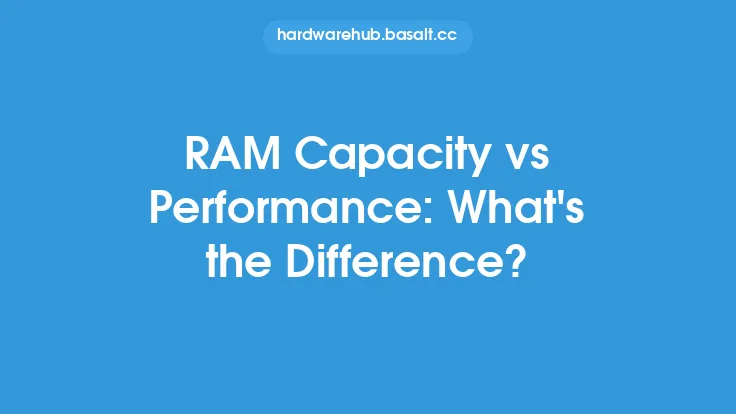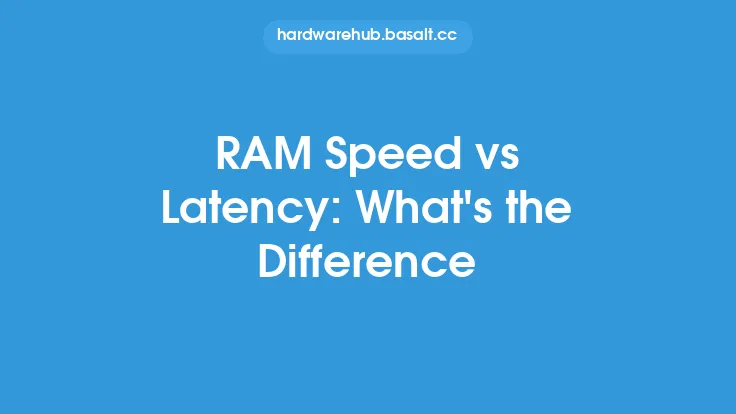When it comes to computer memory, there are several types of RAM (Random Access Memory) available, each with its own set of features and benefits. Two of the most common types of RAM are ECC RAM and Non-ECC RAM. While both types of RAM are used for storing data temporarily while a computer is running, they differ significantly in terms of their functionality, reliability, and application.
Introduction to ECC RAM
ECC RAM, which stands for Error-Correcting Code RAM, is a type of RAM that includes an extra chip on the module to detect and correct data errors that may occur during data transfer. This extra chip, known as a parity chip, adds an extra layer of reliability to the RAM module, making it more suitable for applications where data integrity is crucial. ECC RAM is commonly used in servers, data centers, and other high-end systems where data loss or corruption can have serious consequences.
Introduction to Non-ECC RAM
Non-ECC RAM, on the other hand, does not include the extra parity chip and therefore does not have the ability to detect and correct data errors. Non-ECC RAM is the most common type of RAM used in desktops and laptops, and is generally less expensive than ECC RAM. While Non-ECC RAM is sufficient for most consumer applications, it may not be suitable for applications where data integrity is critical.
Key Differences Between ECC RAM and Non-ECC RAM
The key differences between ECC RAM and Non-ECC RAM lie in their ability to detect and correct data errors, as well as their cost and compatibility. ECC RAM is more expensive than Non-ECC RAM due to the additional parity chip, but it provides a higher level of reliability and data integrity. Non-ECC RAM, on the other hand, is less expensive but may be more prone to data errors and corruption.
How ECC RAM Works
ECC RAM works by adding an extra parity chip to the RAM module, which calculates a checksum for each piece of data stored in the RAM. When the data is retrieved, the parity chip recalculates the checksum and compares it to the original checksum. If the two checksums do not match, the parity chip corrects the error and ensures that the data is accurate. This process happens automatically and transparently to the user, and provides a high level of reliability and data integrity.
Advantages of ECC RAM
The advantages of ECC RAM include its ability to detect and correct data errors, which makes it more reliable and suitable for applications where data integrity is critical. ECC RAM is also less prone to data corruption and loss, which can occur due to electrical interference, power surges, or other environmental factors. Additionally, ECC RAM can help to prevent system crashes and downtime, which can be costly and time-consuming to repair.
Disadvantages of ECC RAM
The disadvantages of ECC RAM include its higher cost compared to Non-ECC RAM, as well as its lower speed and compatibility issues with some systems. ECC RAM is generally more expensive than Non-ECC RAM due to the additional parity chip, which can add to the overall cost of the system. Additionally, ECC RAM may not be compatible with all systems, and may require specific hardware and software configurations to function properly.
Advantages of Non-ECC RAM
The advantages of Non-ECC RAM include its lower cost and wider compatibility with different systems. Non-ECC RAM is generally less expensive than ECC RAM, making it a more affordable option for consumers and businesses. Additionally, Non-ECC RAM is widely compatible with most systems, and can be easily installed and configured.
Disadvantages of Non-ECC RAM
The disadvantages of Non-ECC RAM include its lack of error correction and detection capabilities, which can make it more prone to data errors and corruption. Non-ECC RAM does not include the extra parity chip, which means that it relies on the system's software and hardware to detect and correct data errors. This can lead to data loss and corruption, particularly in applications where data integrity is critical.
Applications of ECC RAM and Non-ECC RAM
ECC RAM is commonly used in servers, data centers, and other high-end systems where data integrity is critical. It is also used in applications such as scientific simulations, financial modeling, and other high-performance computing tasks. Non-ECC RAM, on the other hand, is commonly used in desktops, laptops, and other consumer devices where data integrity is not as critical.
Conclusion
In conclusion, ECC RAM and Non-ECC RAM are two different types of RAM that offer distinct advantages and disadvantages. ECC RAM provides a higher level of reliability and data integrity due to its ability to detect and correct data errors, but is more expensive and may have compatibility issues with some systems. Non-ECC RAM, on the other hand, is less expensive and widely compatible, but may be more prone to data errors and corruption. The choice between ECC RAM and Non-ECC RAM ultimately depends on the specific needs and requirements of the application, as well as the budget and compatibility constraints of the system.





